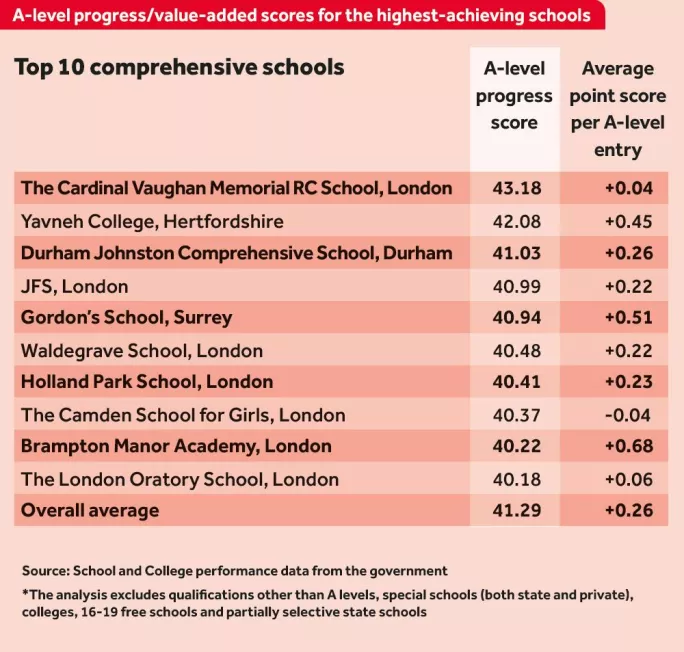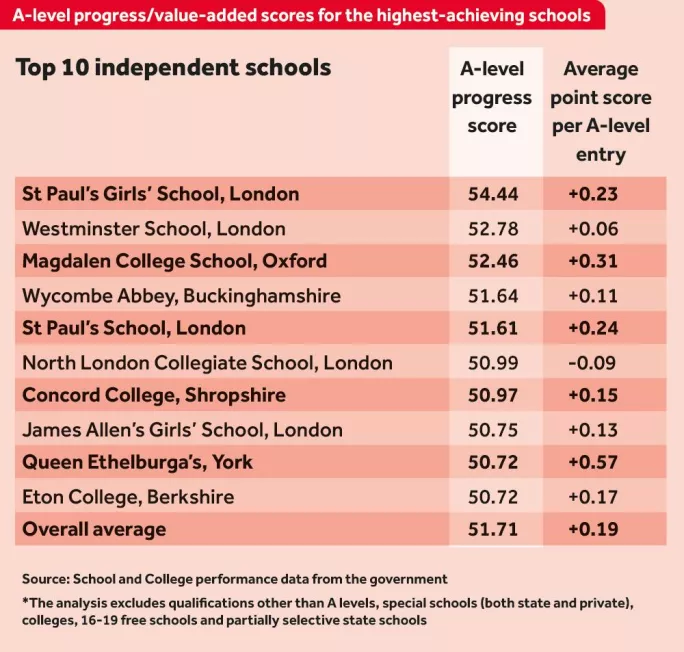
The progress factor: top comps beat independents

Schools will receive their AS and A-level results next week after a nervewracking wait.
The leading independent schools arguably have less to fear from the performance tables, considering that they dominate the top end of them. But a new study by a former Department for Education policy adviser suggests that the top comprehensive schools actually outperform the leading fee-paying schools when it comes to the progress made by A-level students.
However, the Headmasters’ and Headmistresses’ Conference (HMC), which represents the country’s leading independent schools, argues that its schools have less opportunity to progress because their pupils’ GCSE results are already so high.
The new analysis, shared exclusively with Tes, shows that average pupil progress at the 50 comprehensive schools with the highest average A-level point scores in England was higher than at the top 50 independent schools and top 50 grammar schools.
The same was true of pupils aged 16-18 at the top 10 and top 20 comprehensive, independent and grammar schools.
‘Verging on scandalous’
Tom Richmond, a former senior policy adviser at the DfE who now teaches at St Dominic’s Sixth-Form College in north-west London, based his research on government data covering the 2016 results. He calculated the value added by schools, using key stage 4 results as a benchmark, to find out whether pupils made more, less or the same amount of progress as the national average from GCSE to A level.
In his study, a progress score of zero means pupils were making progress from their GCSEs to their A levels in line with the national average for all pupils.
The research finds little difference between the top-performing comprehensive schools and the top-performing fee-paying schools.
On average, pupils at private schools had a higher progress score (+0.07) than pupils at state schools (-0.07) across the country.
But a comparison of the top 10 private schools and comprehensive schools reveals that the comprehensive schools made a quarter of an A-level grade more progress than the national average.

“This analysis shows that, while some private schools do a good job of educating children and young people, many do not,” argues Richmond, a senior policy fellow at the thinktank Policy Exchange.
The Conservative manifesto, published in May, set out an expectation for at least 100 of the top independent schools to sponsor academies or set up free schools. It suggested that the state sector would benefit from the involvement of independent schools, but Richmond’s findings suggest otherwise.
“It is somewhat alarming that the top state comprehensives seem to be delivering a better standard of education than the top private schools for a fraction of the cost,” he says.
Richmond argues that for some of these schools to continue charging parents up to £30,000 a year is “verging on scandalous”.
But the research has been heavily criticised by independent schools. Mike Buchanan, HMC chair, says: “This report is misleading because it forgets that most independent school pupils do so well at GCSE that they have less [distance] to leap to get top grades at A level. It is a perverse theoretical universe in which pupils with top grades at both GCSE and A level are seen as making little progress.” Barnaby Lenon, chairman of the Independent Schools Council, brands the analysis “absurd”. He adds: “To imply there is not outstanding teaching going on [in these top independent schools] is completely wrong. It is just that they have totally cracked GCSEs.”

Richmond’s findings highlight the negative progress score at the prestigious independent school North London Collegiate, but Lenon says: “Virtually no other school in Britain has achieved the same GCSE results as North London Collegiate because virtually every girl gets a top grade in every exam they take.” Progress measures are more effective when looking at a wider ability range, adds Lenon.
Malcolm Trobe, deputy general secretary of the Association of School and College Leaders, says Richmond’s conclusions could be regarded as “over-egging the pudding” - but says the research shows that state schools are performing well despite funding constraints.
“It is an indication that the quality of teaching in both sectors looks to be broadly the same,” he says. “So we’d say ‘well done’ to those in the state sector, particularly with how appalling the funding is between 16 to 18.”
You need a Tes subscription to read this article
Subscribe now to read this article and get other subscriber-only content:
- Unlimited access to all Tes magazine content
- Exclusive subscriber-only stories
- Award-winning email newsletters
- Unlimited access to all Tes magazine content
- Exclusive subscriber-only stories
- Award-winning email newsletters
You need a subscription to read this article
Subscribe now to read this article and get other subscriber-only content, including:
- Unlimited access to all Tes magazine content
- Exclusive subscriber-only stories
- Award-winning email newsletters
- Unlimited access to all Tes magazine content
- Exclusive subscriber-only stories
- Award-winning email newsletters